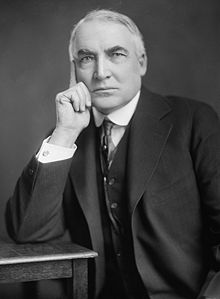📖 Presidential Profile
Comprehensive overview of leadership, policies, and historical significance
📋 Biography & Political Journey
The Return to Normalcy
Warren Gamaliel Harding won the 1920 presidential election by promising a **”return to normalcy”** after the turbulent Wilson years of World War I and progressive reform. His campaign appealed to Americans tired of international entanglements and domestic upheaval, offering a more relaxed approach to governance and a focus on business prosperity. Harding’s genial personality and impressive appearance made him popular with voters who saw him as a reassuring figure after years of crisis. His **landslide victory** over James Cox represented a decisive rejection of Wilsonian idealism and internationalism.
Pro-Business Policies and Economic Growth
Harding’s administration pursued policies designed to stimulate business growth and reduce government involvement in the economy. The **Fordney-McCumber Tariff** of 1922 raised protective duties to their highest levels in American history, while tax cuts reduced the burden on wealthy Americans and corporations. His appointment of **Andrew Mellon** as Treasury Secretary signaled the administration’s commitment to business-friendly policies. These measures contributed to the economic expansion of the early 1920s, though critics argued that they favored big business at the expense of farmers and workers.
Immigration Restriction and Social Conservatism
The Harding administration oversaw the passage of restrictive immigration legislation that fundamentally changed American immigration patterns. The **Emergency Quota Act** of 1921 and subsequent **National Origins Act** of 1924 established quotas that heavily favored Northern and Western European immigrants while severely limiting immigration from Southern and Eastern Europe, Asia, and Africa. These measures reflected the nativist sentiment of the 1920s and Harding’s belief that unrestricted immigration threatened American wages and social cohesion.
The Teapot Dome Scandal and Administrative Corruption
Harding’s presidency became synonymous with corruption and scandal, particularly the **Teapot Dome affair** involving Interior Secretary Albert Fall’s illegal leasing of government oil reserves to private companies in exchange for bribes. The scandal, along with corruption in the Veterans Bureau and other agencies, revealed the extent to which Harding had appointed unqualified cronies to important positions. While Harding himself was not directly implicated in the corruption, his **loyalty to dishonest friends** and poor judgment in appointments severely damaged the presidency’s reputation. The phrase “**Ohio Gang**” became shorthand for political corruption and cronyism.
The White House Poker Games
Harding’s love of poker led to **regular card games in the White House** that became legendary among Washington insiders. These sessions, held twice weekly, included Cabinet members, senators, and business leaders, with stakes sometimes reaching hundreds of dollars per hand. During one particularly memorable game, Harding reportedly **bet a set of White House china** and lost it to a visiting senator, requiring staff to quietly retrieve the dishes the next day. The games often lasted until dawn, and rumor had it that important government decisions were sometimes **made at the poker table rather than in formal meetings**, leading critics to joke that American foreign policy was being decided by whoever held the best hand.
Humor & Jokes
Harding's Affairs
Harding had so many affairs, the Secret Service needed a separate calendar just to keep…
Read More →Greatest Wins
⚖️ Advancement of Civil Rights and Anti-Lynching Advocacy
Harding became the first president to publicly condemn lynching and advocate for civil rights in…
Read More →Epic Fails
🌍 Isolationist Foreign Policy and League of Nations Rejection
Harding abandoned Wilson's internationalist vision, keeping America out of the League of Nations and retreating…
Read More →